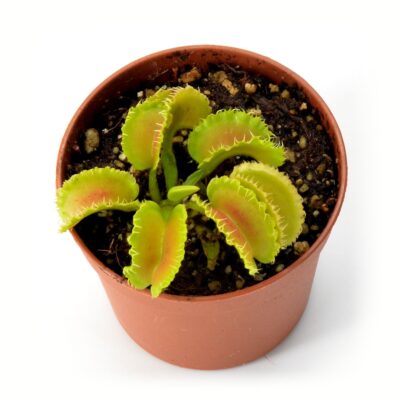Rooting powder with mycorrhizae
3.55€ *Natural rooting powder with mycorrhizae enhances root development in herbaceous and semi-woody cuttings. Not a phytosanitary product.
++ 30% off on all Venus flytraps with double traps – Click here
++
For beginners & collectors
Access to rare varieties
Fast shipping
Environmentally friendly
On this page you can find all the growing supplies you may need for growing carnivorous plants
Showing 1–28 of 47 results


Natural rooting powder with mycorrhizae enhances root development in herbaceous and semi-woody cuttings. Not a phytosanitary product.


Square black pot 14x14x16cm useful for growing big plants and saving space by placing a large number of pots close together.


White tray (39×26,5×5,5 cm) that can hold 20 6.5-cm pots with 1-cm raised holes that provide slight water stagnation. Very useful!


Round brick-colored pot with a diameter of 16 cm and height of 14 cm, perfect for growing large plants such as Sarracenia.


Round brick-colored pot with a diameter of 30 cm and a height of 26,5 cm perfect for growing large plants. The biggest present from us!


White basket with a diameter of 14 cm consists of the pot, supported by a hook and a saucer that ensures minimal water stagnation.


Round brick-colored pot with a diameter of 21 cm and a height of 18,5 cm perfect for growing large plants like sarracenia.


Square black pot 7x7x8 cm useful for growing small plants and saving space by placing a large number of pots close together.


Round brick-colored pot with a diameter of 6.5 cm and a height of 6 cm perfect for growing small plants. The most used by us!


Black tray 57×42 cm and 9 cm high to ensure a high water level for plants that require a lot of water. Suitable for pots of any size.


Black square pot 10x10x12 cm useful for growing medium-sized plants and saving space by placing a large number of pots close together.


Large black 144-hole plugs tray (52x30x6,5 cm). Ideal for planting and growing cuttings and small plants. Less robust plugs tray compared to the small one.


Square black pot 9x9x13 cm useful for growing medium-sized plants and saving space by placing a large number of pots close together.


Small white 144-hole plugs tray (48×26,5×4 cm). Ideal for planting and growing cuttings and small plants. Very robust plugs tray!


Blonde Sphagnum Peat is the substrate par excellence, used for growing our carnivorous plants, usually mixed 50/50 with perlite.


Kanuma (2/5 mm): Keeps the soil moist, aerated and more acidic than akadama. Can be used to increase the supply of nutrients.


Coconut fiber is light, well-ventilated and oxygenated, has excellent drainage, stable pH, retains moisture, and is environmentally friendly and recyclable.


Red volcanic lapillus (3-5mm), porous rock for carnivorous plants. Not inert; suitable for species tolerating soil salinity. Formed from lower-silica magma.


Seramis is an ideal substrate for various carnivorous plants. The high porosity maintains perfect moisture and supports various fertilizers.


Akadama literally means “Red ball soil” and is a volcanic clay collected at a depth of 3 meters in Japan. Remove organisms and pests.


Tuff fine size is a mineral substrate used mainly for Pinguicula cultivation, either alone or mixed with other mineral compounds or with peat and agriperlite.


Substrate studied and tested by Diflora for optimal cultivation of Heliamphora. 30% parts pumice, 30% parts perlite, 40% parts peat.


Substrate studied and tested by Diflora for optimal cultivation of Nepenthes growing on mineral soils. Kanuma, akadama, lapilli and peat.


The tuff (8-14 mm) is a volcanic rock with a high content of SiO2, Al2O3, K2O. It resists oxidation/hydration and has several minerals within it.


Substrate studied and tested by Diflora for optimal growth of Cephalotus follicularis composed of 30% pumice, 30% quartz and 40% peat.


Kiryuzuna: Japanese zeolite from volcanic gravel. pH 6.5-6.8, ideal for acid-loving plants. Collected, dried, heated, and pulverized.


Substrate for Cephalotus (premium) is studied and tested by Diflora for optimal growth of Cephalotus follicularis. Seramis, pumice, perlite,quartz, peat.


Pine bark in substrates is very useful for aerating the substrate; it is used for growing Nepenthes, Brocchinia and Catopsis.


Heliamphora minor, a carnivorous plant from Venezuelan Tepui, thrives in tropical highland conditions, but adapts well to most crops.


Pinguicula sp. Tolatongo: Mexican and tropical small, purplish plant with folded white-tipped lobes. Ideal for beginners. Prostrate shape.


Blonde Sphagnum Peat is the substrate par excellence, used for growing our carnivorous plants, usually mixed 50/50 with perlite.


Blond peat of sphagnum moss and perlite, mixed to 50%. The classic appropriate mix to make many carnivorous plant grow at their best, prepared by our staff.


Dionaea muscipula “Kim Il Sung”: Unique, aggressive form. Striking, distinctive appearance with irregular teeth and wavy forms. A must-have for fans!


Dionaea muscipula ‘Alien’ is a giant prostrate plant with elongated, bean-shaped, and arched traps. One of the most notable features of this cultivar’s traps is their dentition, which vaguely resembles the teeth of a monster or an alien. The “teeth” of the traps are often fused together at the base, creating a jagged and irregular appearance.


Pinguicula laueana (Crimson Flower): Tropical carnivorous plant, dark green leaves, stunning red flowers. Great for beginners.


Drosera rotundifolia is easy to grow; it has green leaves, the trap is green but if it is exposed to full sun it turns slightly red.


Agriperlite increases soil aeration for carnivorous plants. Mixed with sphagnum peat, it is an inert, expands 20 times and is microbiologically safe.


“Dionaea AR Werewolf”: upright clone with dark red color, narrow petiole, and stubby-toothed traps. Wavy and irregular. Striking yellow-orange leaf edge.
For beginners and collectors
Access to rare and unusual varieties
Sustainable & environmentally friendly
Fast and secure international shipping
Stay up-to-date with the latest news and offers from Diflora! By subscribing to our newsletter, you’ll be the first to know about new arrivals, exclusive promotions, and expert tips on how to care for your plants.
No products in the cart.
Recently viewed products: